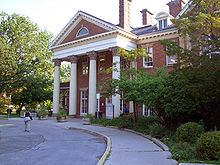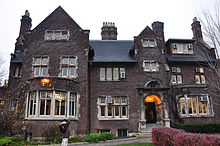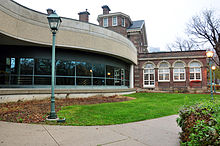- University of Toronto Faculty of Law
-
University of Toronto Faculty of Law Established 1887 School type Public Endowment $57 million CAD[1] Parent endowment $1.286 billion CAD[2] Dean Mayo Moran Location Toronto, Canada Enrollment approximately 600 (515 J.D.; 85 LL.M and S.J.D.) Faculty 60 full-time, 60 adjunct, 15-25 visiting Annual tuition $25,389 CAD Website www.law.utoronto.ca Established in 1887, the University of Toronto Faculty of Law is one of the oldest professional faculties at the University of Toronto. The Faculty of Law is particularly renowned in the areas of corporate law, international law, law and economics, and legal theory.
The median undergraduate GPA of students accepted into the J.D. program is 3.85, and the median Law School Admission Test (LSAT) score is 168 (96th percentile),[3][4] making the law school the most selective in Canada, and one of the most selective in North America.[5] The Faculty of Law offers its students Canada's most extensive internship program in pro bono work and international human rights law, and supports a range of legal clinics staffed by students as well as practitioners.
The Faculty of Law has close to 60 full-time faculty members, and 600 undergraduate and graduate students, giving it a student-faculty ratio of approximately 10:1, one of the lowest in North America. Its "Distinguished Visitors" program brings 15-25 short-term visiting professors from the world's leading law schools to teach at the school each year. For 2010-11, visiting professors include: Frank Iacobucci, former Puisne Justice of the Supreme Court of Canada; Aharon Barak, former President of the Supreme Court of Israel; Dieter Grimm, former Justice of the Federal Constitutional Court of Germany; and James C. Hathaway, former Dean of the Melbourne Law School.
The Faculty of Law lies at the geographic centre of the University of Toronto. It is located at the corner of Queen's Park Crescent and Hoskin Avenue, south of the Royal Ontario Museum and slightly north of the Legislative Assembly of Ontario.
Among its alumni are two Canadian Prime Ministers, three Chiefs of Staff to the Prime Minister, two Premiers of Ontario, two Mayors of Toronto, and six Justices of the Supreme Court of Canada, including three of the nine currently-sitting Justices (Louis LeBel, Rosalie Abella, and Michael J. Moldaver).
The current Dean of the Faculty of Law is Professor Mayo Moran, who was reappointed for a second five-year term as Dean beginning January 2011.
Contents
Falconer Hall
Falconer Hall is home to many of the faculty's offices, including the Office of the Dean, and four seminar rooms. The third floor of Falconer Hall currently hosts the offices of most of the Faculty's scholars of law and economics, including one of the field's founders, Michael Trebilcock. Falconer Hall is also the current home of the Trebilcock Law and Economics Common Room, which is named in Trebilcock's honour.[citation needed]
Early history
Although the University of Toronto Faculty of Law was established in 1887, it was not until 1949 that it adopted its current form. In the 1940s, the Faculty played the leading role in making legal education in Ontario into a modern academic degree course, rather than an apprenticeship.
In 1949, Cecil (“Caesar”) Wright assumed the deanship of the Faculty of Law. He first had to resign his post as Dean of Osgoode Hall Law School, the seat of the Law Society of Upper Canada, rejecting the Law Society's apprenticeship model of legal education in favour of the University of Toronto's vision of a full-time legal education, hinging on the professional bachelor of laws degree and embedded within a university. Wright brought with him his colleagues John Willis and Bora Laskin, the latter of whom would go on to become Chief Justice of the Supreme Court of Canada.
Despite the Faculty of Law's academic program, the Law Society of Upper Canada refused to recognize it as a degree-granting institution for the purposes of accreditation. In the early 1950s, law students and their supporters petitioned the Law Society, and in 1953, a group of 50 student protesters marched on Osgoode Hall demanding formal recognition for the Faculty of Law. Finally, in 1958, after years of negotiation and discord, the Law Society began to give credit to graduates of the law school seeking admission to the Ontario bar.
Tuition and financial aid
Tuition fees for entering Juris Doctor (J.D.) students as of 2010 are $23,350 per annum (excluding incidental fees). Although the Faculty of Law has the highest tuition fees of any law school in Canada, it also has a generous financial aid program.
All students who have eligible unmet need according to the financial aid policies will receive assistance in the form of bursaries and interest-free loans. The most controversial part of the faculty's financial aid program, which was initially designed by students and administration collaboratively, is that it uses a "deemed parental contribution" as part of determining a student's unmet need. There is no deemed parental contribution below an income threshold that is around the average Canadian household income. The deemed parental contribution phases out with the age of the student.
The Faculty of Law is the only law school in Canada with a back-end debt relief program for graduates who choose to pursue low income employment. The "back end debt relief program" is targeted to relieve debt with respect to financial aid/interest-free loans that are recognized by the faculty; most third-party debt (lines of credit; credit cards; mortgage debt) is not recognized and is not eligible for faculty support.
Degrees granted
The Faculty of Law was the first law school in Canada to offer the Juris Doctor (J.D.) rather than the Bachelor of Laws (LL.B). The J.D. designation is intended to reflect the fact that the vast majority of the law school’s graduates enter the law school with at least one university degree. (In fact, approximately one quarter enter with one or more graduate degrees.) The J.D. designation does not, however, reflect significant changes in the law school's curriculum. The move to the J.D. was controversial at the time it was announced, though it has now gained wide acceptance and has been emulated by a number of other Canadian law schools.
Student organizations
Students manage a remarkable range of organizations and activities at the Faculty of Law. Activities include free legal clinics such as Downtown Legal Services, mooting, law journals, and interest oriented clubs. The umbrella organization for JD students at the Faculty of Law is the Students' Law Society. The umbrella organization for graduate students is the Graduate Students' Law Society. The student societies act as student governments, providing funding to student organizations and advocating on behalf of students to the faculty and administration.[6][7]
The four student-run law journals at the Faculty are:
- University of Toronto Faculty of Law Review
- Journal of International Law and International Relations
- Journal of Law and Equality
- Indigenous Law Journal
Selected alumni
- William Lyon Mackenzie King (1896) - Prime Minister of Canada (1935-1948)
- Bora Laskin (1933) - Chief Justice of the Supreme Court of Canada (1973-1984)
- Jerry Grafstein (1954) - Senator (1984-2010)
- John C. Major (1957) - Puisne Justice of Supreme Court of Canada (1992-2005), Commissioner for the Air India Inquiry
- John Sewell (1964) - Mayor of Toronto (1978-1980), columnist
- Paul Martin (1964) - Prime Minister of Canada (2003-2006)
- Bill Graham (1964) - former Minister of Foreign Affairs, Minister of Defence, and interim Leader of the Opposition
- Ian Binnie (1965) - Puisne Justice of Supreme Court of Canada, (1998-2011)
- Louis LeBel (1966) - Puisne Justice of Supreme Court of Canada, (2000-Present)
- David Peterson (1967) - Premier of Ontario (1985-1990)
- Clayton Ruby (1969) - criminal lawyer
- Rosalie Silberman Abella (1970) - Puisne Justice of Supreme Court of Canada (2004-Present)
- Michael J. Moldaver (1971) - Puisne Justice of Supreme Court of Canada (2011-Present)
- Ernest Weinrib (1972) - professor and noted private law theorist
- Bob Rae (1977) - Premier of Ontario (1990-1995), Member of Parliament (1978-1982, 2008-present), Liberal Party of Canada foreign affairs critic
- Stephen Stohn (1977) - television producer (Degrassi franchise)
- David Shore (1982) - television writer (House)
- George Triantis (1983) - Harvard professor and specialist in corporate law
- Patrick Macklem (1984) - professor and specialist in labour, indigenous, and constitutional law
- David Miller (1984) - Mayor of Toronto (2003-2010)
- Tony Clement (1986) - current President of the Treasury Board
- Ronald J. Daniels (1986) - Dean of the Faculty of Law (1995-2005), current President of Johns Hopkins University
- Kent Roach (1987) - professor and specialist in criminal and constitutional law
- Karl Jaffary - Vice-President of the New Democratic Party (1969-1973), Toronto city alderman (1969-1974), and noted urban reformist.
- Robert Prichard - Dean of the Faculty of Law (1984-1990), President of the University of Toronto (1990-2000)
- David Kilgour - democracy activist and former MP (who represented both the Progressive Conservative and Liberal parties)
References
- ^ University of Toronto Faculty of Law, Dean Ronald J. Daniels and the Faculty of Law, http://www.law.utoronto.ca/prosp_stdn_content.asp?itemPath=3/4/15/0/0&contentId=1194, retrieved 2009-07-26
- ^ Figure does not include separate endowment funds maintained by individual colleges. Riggall, Catherine (2009) ([dead link]), University of Toronto Financial Report, Office of the Vice-President, Business Affairs, http://www.finance.utoronto.ca/Assets/reports/financial/2009.pdf
- ^ Official Guide to Canadian Law Schools
- ^ Law School Admission Council
- ^ Top Law Schools Ranking
- ^ http://www.law.utoronto.ca/students_content.asp?itemPath=2/12/0/0/0&contentId=1087&cType=webpages
- ^ http://www.slstoronto.ca
External links
- University of Toronto Faculty of Law
- Ultra Vires - the independent student newspaper of the UofT Faculty of Law
- Students' Law Society - the student government of UofT Faculty of Law
- University of Toronto Law School Faculty Blog
- University of Toronto Law School Alumni Network
Coordinates: 43°39′58″N 79°23′38″W / 43.66611°N 79.39389°W
Law Core subjects 
Other subjects - Abusive language
- Admiralty law
- Aviation law
- Banking law
- Bankruptcy
- Commercial law
- Competition law
- Conflict of laws
- Consumer protection
- Corporate law
- Energy law
- Entertainment law
- Environmental law
- Family law
- Financial regulation
- Human rights
- Immigration law
- Intellectual property
- International criminal law
- Labour law
- Military law
- Music law
- Procedure
- Product liability
- Space law
- Sports law
- Tax law
- Unjust enrichment
- Wills
Legal systems Legal theory - Critical legal studies
- Comparative law
- Economic analysis
- History
- International legal theory
- Philosophy
- Sociology
Legal institutions - University of Manitoba
- Queen's University
- University of Ottawa
- University of Toronto
- University of Western Ontario
- University of Windsor
- York University
Schools teaching civil law - University of Ottawa
Categories:- University of Toronto
- Law schools in Canada
- Neoclassical architecture in Canada
Wikimedia Foundation. 2010.




